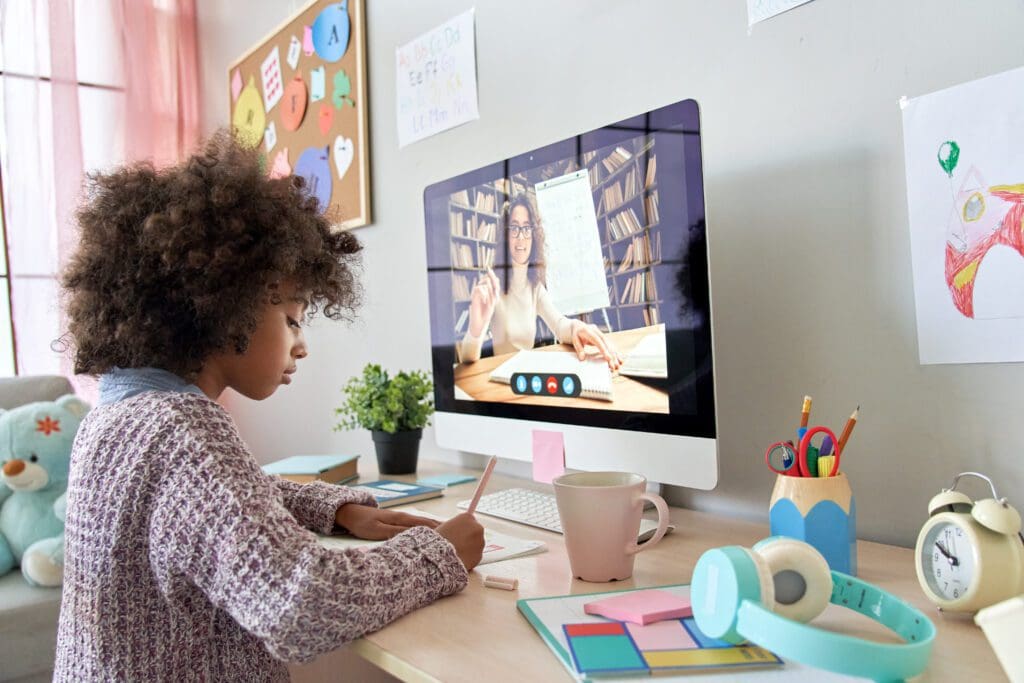Technology And Young Children: 6 Positives of Using Devices
Some time ago, I thought that when my kids got older, I would read them my favorite children’s books and watch my favorite children’s movies. Yeah, of course…
After several years I’ve found that they don’t like my favorite books and movies. My children play video games and watch their favorite YouTube channels with their smartphones and tablets. With technology and young children spending a lot of time playing games, it’s essential to consider how it affects our young children.
Statistics on children’s use of technology 2022
According to a study conducted by Common Sense Media, children aged 0-8 years in the United States spent an average of 2 hours and 19 minutes per day on screens, with 98% having access to a mobile device at home. The study also found that screen time increased with age, with 8-12-year-olds spending an average of 4 hours and 44 minutes per day on screens. These statistics highlight the need for parents to be mindful of their child’s screen time and set appropriate limits to ensure a healthy balance between technology use and other activities.
The growing prevalence of children and technology in today’s society has sparked debates and concerns about the impact of technology on child development and well-being.
Has technology had a positive or negative effect on children?
Technology has had positive and negative effects on children, depending on how it is used and the context in which it is used.
On the positive side, technology provides children access to vast information and resources they can use for learning and exploration. Kids connect with people worldwide, communicate with friends and family, and learn new skills through online courses and tutorials. Technology has also made education more accessible to children with disabilities and those who live in remote or underprivileged areas.
Overuse of technology can lead to social isolation, lack of sleep, and behavioral problems such as attention deficit disorder. On the negative side, technology can be addictive and lead to a sedentary lifestyle, negatively impacting children’s physical health. Children may also see inappropriate content and face cyberbullying and online predators.
It is important for us as parents to supervise children’s use of technology and set limits on screen time. It is also important to teach children how to use technology responsibly and safely and to encourage them to engage in physical activity, outdoor play, and social interaction with peers.
By introducing technology to children early and guiding them on its appropriate use, we can help them develop the skills they need to succeed in today’s digital world. However, it’s crucial to ensure that we set limits on screen time and take steps to prevent digital device addiction. By being mindful of the impact of technology on young children, we can help them harness its benefits while minimizing its potential negative effects.
I have three children, and I didn’t find anything better than to start worrying:
OMG, I have a digital babysitter.
It’s tempting to hand over the tablet to your little one when you need a moment of quiet, but I’m worried about what kind of influence this “digital babysitter” has on my kids. Will they become addicted to screens? Will they forget how to play with toys and engage with the real world? How do electronic devices affect child development? What are the side effects of overuse of electronic devices on children?
The Wild, Wild Web.
The Internet can be a scary place. Will they be exposed to inappropriate content? Will online predators target them? Will they be able to differentiate between fact and fiction? (BTW, only some adults can do it.) Should children be allowed to use electronic devices? (How often do you think that children should not be allowed to use gadgets? 🙂)
Attention span dilemma.
Will they be able to focus on anything for more than five seconds? Will they be able to pay attention in class and finish their homework? Will they ever be able to hold a conversation with a real person? What is the impact of electronic devices on children’s health? How do Electronics affect children’s brains?
The digital divide.
How can we measure the usage time of electronic devices and their influence on child development? Will they miss out on critical social skills from playing with others? Will they be forever isolated in their digital worlds? (Spoiler: No) 🙂
In today’s digital age, it’s nearly impossible to escape the presence of electronic devices, from smartphones and tablets to laptops and gaming consoles. Children from an early age are growing up with unprecedented access to technology and are often skilled users from a very young age. While there are certainly concerns about the potential negative effects of electronic devices on children, there are also many positive aspects to consider. Let’s see what we have as positive and negative effects and see how we can make technology and young children friends.
Technology and Young Children: Positive and Negative Effects
What are the negative effects of technology?
Screen Addiction
Overusing electronic devices can lead to addiction, negatively impacting children’s health. Sometimes I see that they want to play games and Nothing more.
Sleep disruption
The blue light emitted from electronic devices can interfere with children’s sleep patterns, making it harder for them to fall asleep and stay asleep and causing reduced sleep quality. It is hard to motivate them to do physical activity, which can be the reason for significant weight gain.
Social isolation
Children spend too much time on electronic devices, leading to social isolation, as they may prioritize their devices over in-person social interaction.
What are 5 Positive effects of technology?
Access to educational resources
Electronic gadgets provide children with educational apps and resources to help them learn new things.
Increased Connectivity
With mobile devices, children can easily communicate with family and friends who may be far away. This can help maintain relationships and social interaction, build social skills, and reduce feelings of isolation.
Enhanced Creativity
Some electronic devices and apps can foster children’s creativity, cognitive, and language skills, such as drawing apps, music-making apps, and video editing software.
Improved Problem-Solving Skills
Modern technology and young children are tightly connected; we cannot prevent it. Online games and puzzles can improve children’s problem-solving and critical-thinking skills. We just need to accept and use it.
Access to assistive technologies
Technology can provide assistive tools and devices for children with disabilities to help them communicate, learn, and engage with the world around them.
One day I decided to look at electronic gadgets’ positive and negative effects on children’s lives from another side. I finally accepted that educational apps and internet resources could be valuable during child development. I stopped blaming myself for not entertaining them by running back and forth and coming up with endless quests.
Another Side of Playing Video Games at an Early Age
An excellent way for children to socialize and build relationships
- Video games can also be a with their peers. Many video games are designed for multiplayer or online play, which can allow children to connect with others who share their interests. In addition, video games can provide a shared experience that can be an excellent way for parents and children to bond and spend time together.
- Help children develop a sense of autonomy and independence.
- Children can explore new worlds in video games, make decisions, and solve problems independently. It can be a valuable experience for children, as it can help them build confidence and self-esteem.
Overall, while parents need to set limits, monitor video game use, and motivate them to do physical activities, playing video games can have many positive effects on children’s development. By choosing age-appropriate games and setting reasonable limits, parents can help their children enjoy the benefits of video games while minimizing the potential adverse effects.
How Much Technology Help Me to Organize Usual Life
Quiet
Let’s be honest; a quiet child is a happy parent. Educational apps can keep your little ones occupied for hours, giving you a chance to catch your breath and enjoy a well-deserved break.
Education On The Go
Traveling with kids can be a headache, but with educational apps, you can turn your smartphone or tablet into a portable classroom. No more boredom on long car rides or flights! Use the technology and young children will finally allow you to enjoy travel! 🙂
Mindful Multitasking
You can finally answer those emails and make dinner at the same time! Educational apps can keep your kids entertained while you tackle your to-do list.
Snack Time For The Brain
Just like healthy snacks for the body, educational apps positively affect your kids and provide a nutritious brain workout. Early education is possible with electronic gadgets without too much effort from your side.
Be The Cool Parent
Want to be the envy of all your parents-friends? Impress your kids with your tech-savvy by downloading the latest educational apps. They’ll think you’re a genius, and you’ll finally have something in common with them.
Problem-Solving Skills Development
Many digital games and educational apps require children to use their critical thinking skills to solve problems. For example, puzzle games such as Tetris and Sudoku require players to use strategy to succeed. Similarly, adventure games such as Minecraft and Terraria require players to think creatively and solve problems to progress through the game.
Moreover, some educational apps are explicitly designed for this purpose. For example, coding apps such as Scratch and Code.org teach children to break down complex problems into smaller, more manageable tasks. By learning to code, children develop logical thinking and the ability to approach problems systematically.
In addition, electronic devices allow children to collaborate and problem-solve with others. Multiplayer games such as Roblox and Fortnite require players to work together to achieve a common goal, which can help children develop teamwork and communicate.
By using electronic gadgets to engage in games and educational apps, children can develop their strategic thinking, essential for success in many aspects of their lives. These skills can be applied in academic settings, such as math and science classes, as well as in social situations, such as conflict resolution and decision-making.
Educational Benefits of Using Electronic Gadgets
Convenient and flexible learning
Technology Encourages Spontaneous Learning. Access to technology can help children learn to investigate topics they find interesting. They can be used anywhere and anytime, making it easy to fit learning into a busy schedule.
Affordable education
Many educational apps are available for free or at a low cost. Youtube kids platform provides unique educational content absolutely for free.
Personalized learning
With features such as adaptable difficulty levels, progress tracking, and the ability to cater to individual learning styles, educational apps provide a personalized learning experience.
Engaging and interactive experiences
Using electronic gadgets makes learning fun and memorable. This helps to keep kids motivated and engaged, even when traditional classroom learning becomes challenging.
Skill Development
Educational apps provide opportunities for kids to develop essential skills such as problem-solving, critical thinking, and creativity. Skills are vital for their future in real-life success and can be created in a fun and interactive way.
Peace of mind
You can track their progress and see what they are learning in real time, providing peace of mind and a greater understanding of their academic journey.
Educational Apps Available for Children
Many educational apps are available for children that cater to a wide range of interests and learning styles. Here are some of the most common types:
- Language and literacy
These apps can help children develop their reading and writing skills, learn new vocabulary, and improve their spelling and grammar. - Math
Math apps can help children learn basic math concepts like addition, subtraction, multiplication, and division, as well as more advanced concepts like geometry, algebra, and calculus. - Science
Science apps can help children learn about different scientific disciplines like biology, chemistry, physics, and earth science. They can also help children learn about the scientific method and develop critical thinking skills. - Coding
Coding apps can help children learn the basics of computer programming and develop problem-solving skills. They can also help children learn how to create their games, animations, and websites. - Music and art
Music and art apps can help children develop their creative skills by teaching them how to play instruments, create music, and draw or paint. They can also help children develop their fine motor skills and hand-eye coordination. - Social studies
Social studies apps can help children learn about history, geography, economics, and politics. They can also help children develop an understanding of different cultures and ways of life. - Mindfulness and relaxation
Mindfulness and relaxation apps can help children learn how to manage stress and anxiety, develop self-awareness, and improve their focus and attention span.
As parents, we must be proactive in guiding our kids on the appropriate use of technology and young children shouldn’t see it as the very best and only option to spend time ensuring that it doesn’t hinder their physical, emotional, and social development.

These are just a few examples of the many educational apps available for children. Finding the right apps for your child’s interests and learning style can help them develop new skills and knowledge while keeping them engaged and entertained.
I started diving in deeper and tried to control the process a little bit and use devices and internet resources as teaching and development assistants that could help me. I spent some time sorting out the educational apps and internet resources, speaking with my children, and analyzing their interests. I discovered that they are not only playing games (Who’d have thought!!!):
- my oldest would love to play guitar and is interested in digital marketing
- my middle has an interest in the building architectural forms
- and my youngest loves to draw, learning from different TikTok publishers
I spent some money and bought more valuable educational content and some additional features in apps (yes!), and now:
As a result, I’m happy and satisfied. I know that tablets and the Internet are not only entertainment with adverse effects but also valuable activities with positive effects that fuel their interests and build their general knowledge.
On the question of whether I should allow my children to use electronic devices, my answer is “Yes”. Of course, It’s important to balance the benefits and risks of technology and young children using devices, ensuring they are exposed to its advantages while minimizing its potential negative effects.
If you have the same concerns – find a way to get as many benefits as possible and use technological devices to get value and make your life easier.







